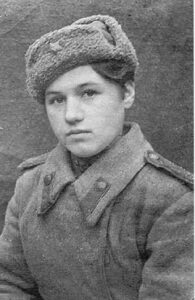Klavdiya Kalugina: The Youngest Female Sniper in the Red Army

The youngest female sniper in the Red Army, WWII
Klavdiya Kalugina was not only the youngest female sniper in the Red Army during WWII, she also had more difficulty shooting than the other cadets. Just fifteen years old when Germany invaded the Soviet Union, she joined the Komsomol (Communist Youth League) with an eye to leaving her job as a munitions factory worker and becoming a sniper. Two years later, in 1943, Klavdiya enrolled in the newly formed Central Women’s Sniper Training School, but the commanders who ran the school were so concerned about her young age, she was told she could train as long as she didn’t fall behind.
Interviewed in 2010 by iremeber.ru* (by https://iremember.ru/en/memoirs/snipers/klavdia-kalugina/), Klavdiya recalls her training days: “We started building a firing range. I wasn’t from a rich family. I had chopped wood, and carried water, I was accustomed to such business, so I worked well. They let me stay, even gave me leave to visit home. When they started teaching us to shoot, but I couldn’t do it. I would fire, and all I hit was “milk” (jargon term denoting a complete miss-trans). Then, Zinaida Andreevna Urantseva, our squad commander, started practicing with me individually. She taught me to shoot well.”
Klavdiya graduated and was sent to the 3rd Belorussian Front in March, 1944. She was seventeen years old. In her interview with iremeber.ru, she explains how she and the eleven other girls in her platoon, started crawling through communication trenches, “packed with snow,” towards no-man’s land, which was dangerously littered with mines. “It was only the first day—we were so afraid.
“Germans were out in the open clearing their trenches. You could probably kill even a dozen Germans on that day. But you see, killing a human being for the first time!” Klavdiya and her shooting partner, Marusia, watched as others shot, yet they couldn’t pull their triggers. That night, they felt terrible as they rest of their platoon talked about their opening their tallies.
The following day, determined to pull her trigger, Klavdiya fired at a German cleaning his gun. “He fell, and was pulled back by his feet. It was my first German.” With the first and most kill behind her, Klavdiya continued successfully taking out Germans. That summer, while on the defensive at Orsha, her platoon was positioned near a lake where they shot Germans washing themselves. Alas, an enemy sniper had the girls in his sights. One afternoon, while Marusia was getting into position, she was shot and killed by a German.
“Oh, how I cried! The German was 200 meters away from us. I screamed so loud it could be heard all over the trenches, soldiers ran out: “Quiet, quiet, or they’ll open mortar fire!” But how could I be quiet? She was my best friend.”
There was no time for mourning. The girls buried Marusia. The next day, they were bombed by the Germans. The regiment retaliated and “chased them down at the Dnieper (River)” where they faced enemy tanks, machine guns and snipers. “I was shell shocked,” Klavdiya recalls in iremember.ru, “but I didn’t go to the medics, because there was blood all around, my uniform was punctured in many places, I was deaf. I thought: “Why would I go, what can they do for me? There are people without legs, without arms, blood covered, why would I go?”And I didn’t go.”
Her platoon was transferred to the Leningrad front where they had to lay in swamps. “If a horse passed by, there was water under the hoofs. You could wash yourself with it, and even drink from that hoof print.” They marched for days as German planes bombed overhead. Using their padded jackets as mattresses, they slept on the ground and one night, when they’d come upon an abandoned house, Klavdiya actually slept poorly in a small trough, used for cutting cabbage, because it was the only space available.
At the Baltic Sea, Klavdiya and her comrades watched a German ship burn. Then, the Red Army attacked. “There were bodies all over the field. When the wind was blowing from the field, you couldn’t breathe. Then there was an offensive at Koenigsberg, we captured it.”
By the time the war ended, Klavdiya was only eighteen years old, yet she’d experienced more trauma and loss than most people throughout their entire lives. And her determination to learn to shoot despite her initial difficulties, to consistently strive to be better amidst moments of all-consuming grief, reflects the collective resiliency of these legendary female snipers.
* iremember.ru
Interviewed by Artem Drabkin
Translated by Oleg Sheremet
Amazing story, it reminds me of the pilot character in The Huntress, by Kate Quinn. look forward to reading the Night Sparrow in July.